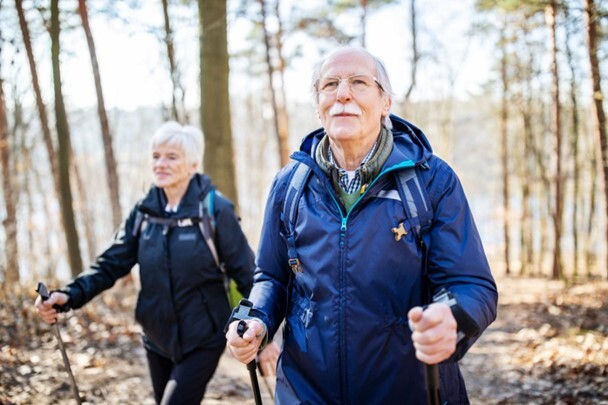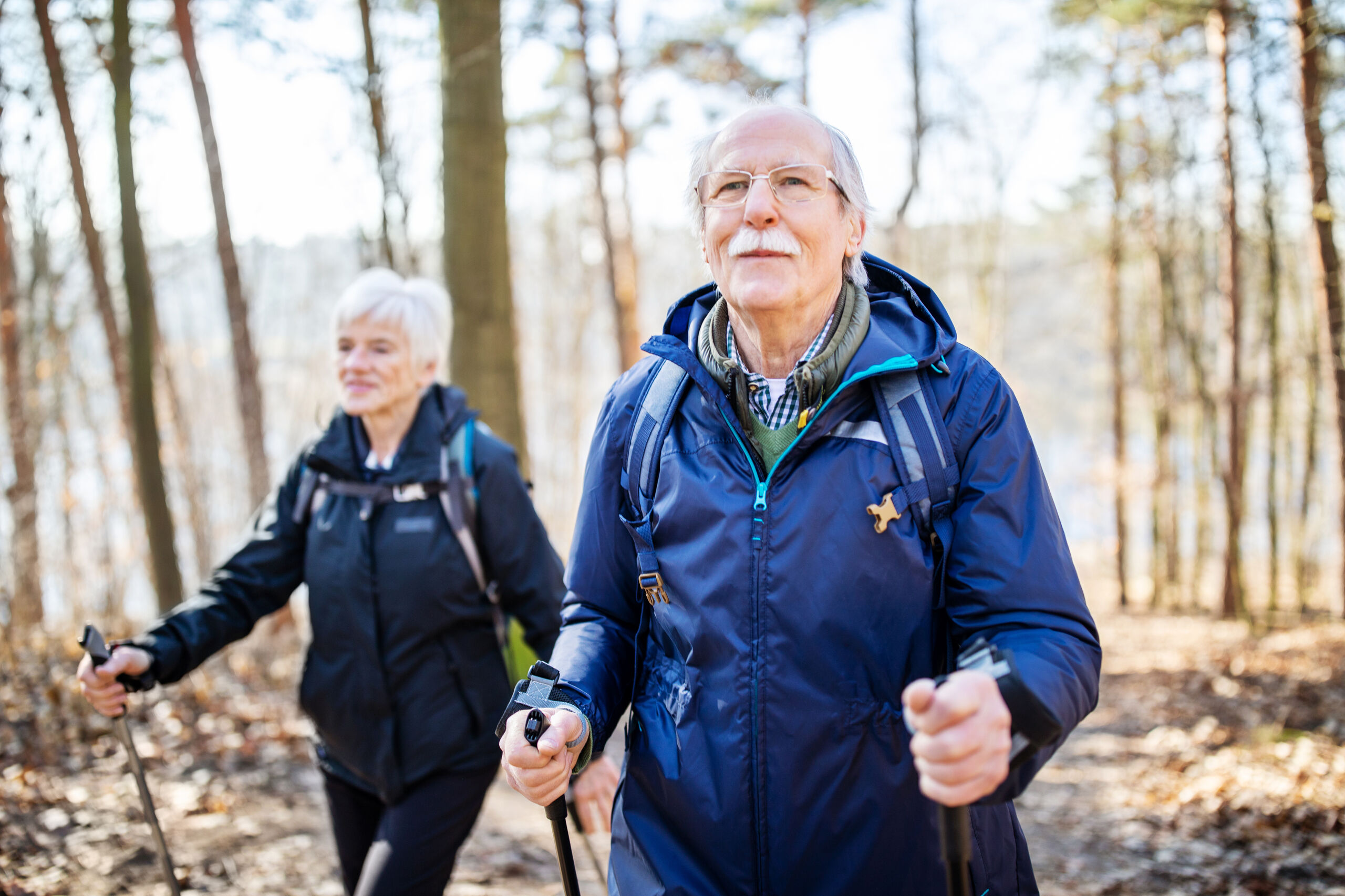01 January 2025
Stories
| Retirement Living, BaptistCare
Download this article as a PDF.
Most of us work our whole lives looking forward to that first day of retirement.
It’s a fresh slate, a clear diary – time to relax and unwind, putting all the pressures of work behind us.
But retirement can also present its challenges. The endless free time can be daunting for some, and a lack of routine can easily lead to less social interaction and a more sedentary lifestyle – all of which can very quickly start to impact our wellbeing.
Creating a structure for your lifestyle can help you to stay active in retirement and as a result - thrive!
Key takeaways:
- Learning new skills is one of the best ways to stay active in retirement and keep your brain healthy as you age
- Staying physically active in older age has been proven to prevent and manage common non-communicable diseases
- An active retirement might also mean reframing your perspectives - what might give your life a new sense of meaning and purpose?
Tips to stay socially active in retirement
Whether you’re a social butterfly or tend to prefer more time alone, maintaining strong social connections in retirement is crucial for your mental health. Consider some of the following:
1. Join a shared interest group
Shared interest groups bring people together with something in common, which often makes it easier to connect. Not only are these groups an excellent opportunity for regular social interaction, but they are also a source of engaging, stimulating conversation around topics that interest you.
You might consider:
- Joining a book club
- Attending a regular games night
- Being part of a choir or music club
2. Get involved in your community

Have you ever considered joining an intergenerational program such as helping local schoolchildren learn to read or mentoring young adults with their career choices? By drawing on your life skills and experiences, these activities can be incredibly rewarding for both parties.
Look into:
- Intergenerational programs in your area
- Local volunteering opportunities
- Faith-based groups such as your local church that run programs in the community
3. Invest in new or existing friendships

Aim to catch up with at least one friend every week, and why not consider widening your circle in retirement? Try organising one or two of the following:
- Join a local meet-up group and get to know some new faces in your area
- Enjoy a weekly morning coffee with a friend
- Schedule a regular walking date with someone you’d like to get to know better
Tips to stay physically active in retirement
Our bodies were made to keep moving. Yes, even in later life.
Making exercise a regular fixture in your routine has been proven to help prevent and manage several common noncommunicable diseases in older age (NCDs).
Keeping fit in retirement also helps maintain a healthy body weight, and can improve mental health and overall quality of life, according to the World Health Organisation.
Here are some fun and easy ways to incorporate more exercise into your retirement lifestyle:
4. Join a walking group
Research from the Heart Foundation shows that walking briskly for just 30 minutes daily can lower the risk of heart disease, stroke, and diabetes by up to 40%!
If you need a bit of extra support, perhaps Nordic walking is more your thing. This increasingly popular exercise is low-impact and activates 90% of the muscles in the body. It’s easier than regular walking and a fantastic way to enjoy the great outdoors.

5. Try swimming or water aerobics
A versatile exercise, swimming and water aerobics are low-impact activities that promote strength, improve your cardio fitness, increase flexibility and balance.
6. Make exercise fun! Learn something new.
From golf to tennis to salsa dancing or karate, there’s bound to be something that’s always interested you, which you’ve never had the time to try. Retirement is all about giving these things a go! Not only will it keep you physically fit, but learning a new skill is great for your brain health, too.
7. Maintain a healthy lifestyle – Eat well, sleep well, and have regular check-ups

Eat well
The difference a healthy diet can make to your physical and mental health is amazing. Not only does good food reduce the risk of health problems like heart disease and diabetes, it also supports your sleeping patterns, energy levels, and overall wellbeing.
For more guidance, including recipe ideas, visit https://www.eatforhealth.gov.au/
Sleep well
It’s easy to underestimate just how beneficial sleep is for our health.
Studies have shown that getting enough sleep in older age promotes better mental wellbeing, increased ability to perform activities of daily living, reduced fall risk, and reduced risk of hospitalisation, among many other positive outcomes.
For tips and advice on sleep hygiene in older age, visit the Sleep Health Foundation.
Be well – organise regular health screenings.
As we age, it’s easy to let the little niggles and pains pass us by. Make sure to have regular GP check-ups scheduled in the diary, along with:
- Skin cancer checks
- Sight and hearing tests
- Dental checks and recommended vaccinations
Find out what other health screenings you might need in your age bracket here.
Tips to stay mentally active in retirement
Did you know that your brain has the ability to continue learning and growing as you age? It’s a process called brain plasticity, and it’s fuelled by new activities that force you to think in new ways.
Learning new skills is one of the best ways to keep your brain healthy as you age and reduce the risk of cognitive decline.
Here are some fun new retirement activities you could try:
8. Learn a musical instrument
Playing a musical instrument uses nearly every area of the brain… at once! Engaging the visual, auditory, and emotional centres, learning an instrument is a wonderful way to give your brain a good workout.
Remember to schedule practice time in your routine so you can keep learning!
9. Get creative!

Keeping up a creative hobby is a great way to relax, express yourself, and ensure your brain stays active and healthy. Why not rekindle an old interest or even try something new? Consider:
- Joining a men’s shed
- Setting up a painting nook in your home
- Creating something unique for grandchildren or someone dear to you
10. Horticulture
Gardening not only provides great exercise out in the fresh air, but it also involves creativity, strategic thinking, and problem solving – all of which are fantastic for your brain health!
Why not join a local community garden and meet people who share your passion?
Don’t forget to keep tabs on your emotional health, too.

For many, retirement can also feel like a time of loss.
When work has been part of your life for decades, it can be hard to let go and reimagine who you are without it.
According to Beyond Blue, 10-15% of older adults experience depression – significantly more than the general population.
It’s important to keep tabs on your emotional health when you retire and seek professional support if you need it. Our final tip for thriving in retirement is:
11. Reframe your perspectives
Reflect and consider:
- What might give your life a new sense of meaning and purpose?
- How can you reframe your mindset in terms of what you have to offer the world?
- Do you need to rethink your perspectives on ageing?
Rather than thinking of retirement as a wind-down from work, try to reframe it as more of a transformation – what will you do with this new and exciting phase of your life?
Can retirement villages support an active retirement lifestyle?

Retirement villages are an increasingly popular option for retirees seeking a physically and socially active lifestyle.
Offering a vibrant program of retirement activities created by residents, for residents, retirement villages have the added benefit of little to no maintenance costs, and the option to receive care in your own home if your health needs change over time.
Learn more about ‘village life’ and decide if it's for you.
How can I find a retirement village near me?
You can explore the benefits of retirement community living near you by simply using BaptistCare’s handy online tool to find a location in New South Wales or Canberra.
Click the link below to learn more about BaptistCare services:
Retirement Living | Financials Explained | Adaptive Living | Find a village
Make an enquiry
If you would like to know more, please complete the form and one of our retirement living specialists will be in touch.
